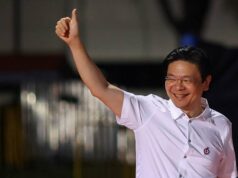Gambling shares plunge after draft revisions to Macao’s gaming law

The Historic Centre of Macao was listed as a UNESCO World Heritage Site in 2015.
Gambling shares plunged on Wednesday in the Hong Kong market as draft revisions to Macao’s gaming law sparked concerns over tougher government oversight of the city’s gaming activities, as it seeks to further diversify the local economy.
Sands China, a unit of US-based casino operator Las Vegas Sands Corp, led the rout with a dive of 32.51 percent. Shares of Galaxy Entertainment Group, a major operator of casinos in Macao, also lost 20 percent.
By comparison, the benchmark Hang Seng Index shed 1.84 percent on Wednesday.
The slump in gaming stocks came as draft revisions to the gaming law, effective since 2001, began subject to a 45-day public consultation period starting Wednesday.
Proposed changes to the existing law include an end to sub-concessions that enabled a three-concession system to evolve into a combination of three main gaming concessions and three sub-concessions, and amended gaming license terms. The six concessions are scheduled to expire in June 2022 and local casino operation will have to rebid for their licenses.
Additionally, there are plans for government-assigned delegates to give greater government oversight of gaming operators’ daily operations, according to a revised draft of the law posted on the website of the Gaming Inspection and Coordination Bureau of the Macao Special Administrative Region.
The market remains split over the impact on the city’s gaming sector of the proposed overhaul.
The current six concessions and sub-concessions are estimated to all become main licenses, news.rthk.hk reported Wednesday, citing Hoffman Ma Ho, deputy chairman of Success Universe Group, a Hong Kong-based investment firm primarily engaged in the travel and lottery sectors.
The appointment of delegates to gaming operators is set to address the issue with certain gaming firms that turn earnings entirely into dividend payments before debt settlement, according to Ma, reckoning the proposed measure as a move to reduce gaming firms’ exposure to financial risks.
As the local government tends to weight toward the development of exhibition, travel and culture projects, the regulatory tightening as a consequence of the delegate appointment could affect the VIP casino business, said Yan Zhaojun, a strategist at Zhongtai Financial International, as quoted in the report.
US-funded operators are likely to take a bigger hit from the proposed revisions, Yan forecast, citing a revision to the current legal framework that would increase the shareholding of Macao’s permanent residents, thereby resulting in an equity dilution of US shareholders.
Gaming taxes have accounted for 70-80 percent of local government revenue over recent years while gaming revenues make up 55.5 percent of the city’s GDP, read the draft revised text. By the end of 2020, the gaming sector employed 820,433, representing roughly 17.23 percent of the local workforce.
Source : Global Times




